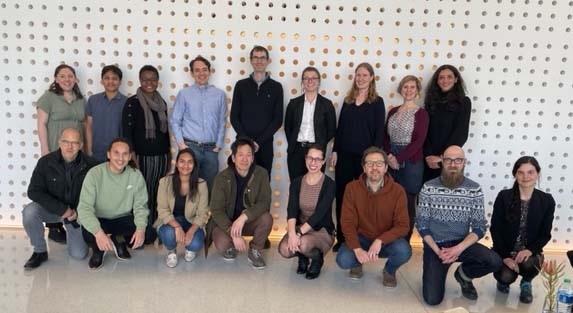Over a recent weekend, RIC co-sponsored a workshop held at the University of Chicago titled “Policing the World: Entanglements and Convergences across the North-South Divide.” RIC associate director Stuart Schrader co-organized the workshop with Julian Go, professor of sociology at University of Chicago.
The workshop featured sixteen scholars from eleven universities across four countries, Canada, Denmark, the Philippines, and the United States. Two RIC kinfolk attended and presented dissertation chapter drafts, political science PhD candidates Sabrina Axster and Stephanie Saxton. A complete list of the participants is below.
The goal of the workshop was to share critical new scholarship on policing in comparative and historical perspective, with an emphasis on colonial legacies across the globe, as well as contemporary programs of security assistance and training undertaken by international organizations. In general, comparative scholarship on policing retains what critics would call “methodological nationalism,” or the tacit assumption that nation-states are the correct and adequate units of analysis for social process that implicitly remain bounded by their borders. In contrast, this workshop scrutinized that assumption through new research on the entanglements across nation-state borders that have co-produced police agencies and policing tactics, techniques, and technologies around the globe.
Central to this type of analysis of policing is a recognition of the importance of long genealogies of capitalism as a world-system and the crucial role of colonial state-making in producing the institutional legacies that have birthed the policing systems of today.
Workshop participant Yanilda Gonzalez, assistant professor of public policy at Harvard Kennedy School, commented that the event “was a remarkable yet rare example of comparative, interdisciplinary exchange done right.” She continued, “For my part, the conference helped elucidate the longue durée of policing processes I study in more contemporary periods, as well as the transnational flow of ideas and policy proposals that have been prominent in the contexts I study.”
Go and Schrader have been planning the Policing the World workshop for well over a year. The idea grew out of conference panel presentations for the Social Science History Association and International Studies Association, as well as Schrader’s special issue of the journal Small Wars & Insurgencies, published in 2022, and the RIC Entangled Solidarities symposium in 2021. At its core, the workshop took inspiration from ongoing social movement activism that has criticized unjust policing practices, whether in Chicago, Baltimore, Manila, or Johannesburg, by recognizing the entanglement of police expertise, technologies, and practices that links these locations.
Among the topics investigated by workshop participants, contemporary bilateral and multilateral police assistance earned a good deal of attention. Today, agencies like the Inter-American Development Bank and Asian Development Bank, the United Nations, and the U.S. State Department all play key roles in strengthening police across the globe, focused on capacity-building and reform. Scholars including Zoha Waseem, assistant professor of criminology at the University of Warwick, Maya Van Nuys, PhD candidate at the University of Chicago, and Enrique Alvear, PhD candidate at the University of Illinois Chicago, all previewed pathbreaking new scholarship into these complex networks of police training and assistance. The study of such policing practices does not easily fit into a single discipline or subfield, given that policing is typically understood as domestic and local in orientation, and thus outside International Relations, while bilateral relations among states or multilateral organizations are often seen as transcending the gritty lower frequencies of street crime and local law enforcement. Yet this emerging research rethinks these inherited approaches and assumptions.
JHU PhD candidate Stephanie Saxton commented, “‘Policing the World’ was a rich, interdisciplinary, and transnational space. The feedback was respectful and constructive and, as a grad student, it was wonderful to read and discuss the various projects linking police to empire.”
Other co-sponsors included the University of Chicago Justice Project, the Center for International Social Science Research at the University of Chicago, and the Division of the Social Sciences at the University of Chicago.
RIC is currently planning a follow-up workshop at JHU in 2024 to continue and build on the exchange of ideas that took place at “Policing the World.”
Co-organizers:
- Julian Go (University of Chicago)
- Stuart Schrader (Johns Hopkins University)
Participants:
- Enrique Alvear (University of Illinois Chicago)
- Sabrina Axster (John Hopkins University)
- Colleen Bell (University of Saskatchewan, Canada)
- Danielle Beaujon (University of Illinois Chicago)
- Andy Clarno (University of Illinois Chicago)
- Adam Elliot-Cooper (Queen Mary University of London, UK)
- Yanilda González (Harvard University)
- Karl Arvin Hapal (University of Philippines-Diliman)
- Markus-Michael Müller (Roskilde University, Denmark)
- Lou Pingeot (McGill University, Canada)
- Stephanie Saxton (John Hopkins University)
- Kathryn Takabvirwa (University of Chicago)
- Maya Van Nuys (University of Chicago)
- Zoha Waseem (University of Warwick, UK)
- Jesse Wozniak (West Virginia University)

